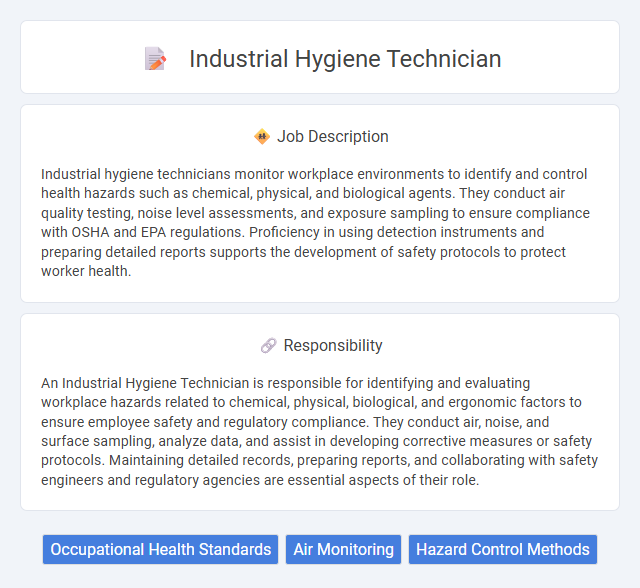
Industrial hygiene technicians monitor workplace environments to identify and control health hazards such as chemical, physical, and biological agents. They conduct air quality testing, noise level assessments, and exposure sampling to ensure compliance with OSHA and EPA regulations. Proficiency in using detection instruments and preparing detailed reports supports the development of safety protocols to protect worker health.
People who are detail-oriented and have strong analytical skills are likely suitable for the industrial hygiene technician role, as it requires identifying and controlling workplace hazards. Individuals comfortable working in various industrial environments and prepared to handle potential exposure to chemicals, noise, or airborne contaminants may find this job appropriate. Those with a focus on safety and a willingness to learn regulatory standards probably stand a higher chance of success in this position.
Qualification
An Industrial Hygiene Technician must possess a strong foundation in environmental science, chemistry, or occupational health, typically requiring an associate degree or relevant certification such as the Certified Industrial Hygienist (CIH) credential. Proficiency in monitoring workplace hazards like chemical, biological, physical agents, and familiarity with regulations from OSHA and NIOSH ensures effective hazard identification and mitigation. Key qualifications also include experience with air sampling instruments, data analysis software, and the ability to conduct thorough risk assessments to support worker safety programs.
Responsibility
An Industrial Hygiene Technician is responsible for identifying and evaluating workplace hazards related to chemical, physical, biological, and ergonomic factors to ensure employee safety and regulatory compliance. They conduct air, noise, and surface sampling, analyze data, and assist in developing corrective measures or safety protocols. Maintaining detailed records, preparing reports, and collaborating with safety engineers and regulatory agencies are essential aspects of their role.
Benefit
Industrial hygiene technicians likely experience benefits such as improved workplace safety and reduced exposure to hazardous substances. Their role probably leads to increased awareness and compliance with health regulations, potentially decreasing illness and injury rates. Employers may benefit from lower healthcare costs and enhanced employee productivity as a result.
Challenge
An industrial hygiene technician likely faces the challenge of accurately identifying and assessing workplace hazards that could affect employee health and safety. The role may require adapting to diverse environments and evolving regulations, demanding continuous learning and vigilance. Balancing technical analysis with effective communication to management and staff might also pose significant complexities.
Career Advancement
Industrial hygiene technicians play a crucial role in monitoring workplace environments to ensure safety and regulatory compliance, which offers a strong foundation for career advancement into industrial hygienist or environmental health specialist roles. Gaining certifications such as Certified Industrial Hygienist (CIH) enhances professional credibility and opens opportunities for higher-level positions in risk management and occupational health. Continuous education and hands-on experience in exposure assessment, hazard control, and data analysis significantly contribute to upward mobility within this field.
Key Terms
Occupational Health Standards
Industrial hygiene technicians ensure workplaces comply with Occupational Health Standards by monitoring exposure to hazardous materials and assessing environmental risks. They collect air, noise, and chemical samples to identify potential health hazards and support corrective actions based on regulatory guidelines from OSHA and NIOSH. Their role is crucial in maintaining safe working conditions and preventing occupational illnesses through systematic health surveillance and exposure control measures.
Air Monitoring
Industrial hygiene technicians specializing in air monitoring conduct precise sampling and analysis of workplace air to detect hazardous substances such as volatile organic compounds (VOCs), particulate matter, and chemical gases. They utilize advanced instruments like gas chromatographs, photometers, and direct-reading monitors to ensure compliance with OSHA and NIOSH airborne exposure limits. Regular air quality assessments and real-time data collection help identify contamination sources, enabling effective control measures to protect worker health and maintain safe industrial environments.
Hazard Control Methods
Industrial hygiene technicians implement hazard control methods such as engineering controls, administrative controls, and personal protective equipment (PPE) to minimize workplace exposure to chemical, physical, and biological hazards. They conduct air and noise monitoring, ventilation assessments, and contamination surveys to identify risks and recommend effective mitigation strategies. Their expertise in selecting and maintaining appropriate hazard control measures ensures compliance with OSHA regulations and promotes worker health and safety.
 kuljobs.com
kuljobs.com